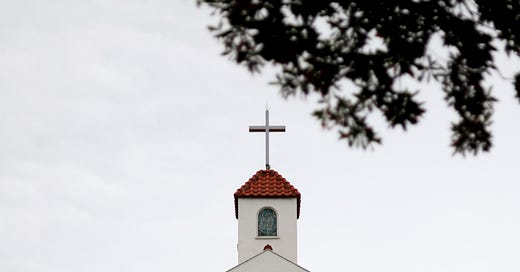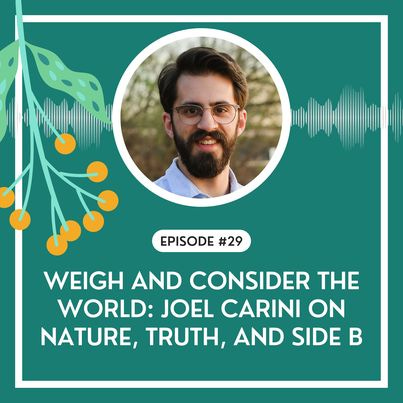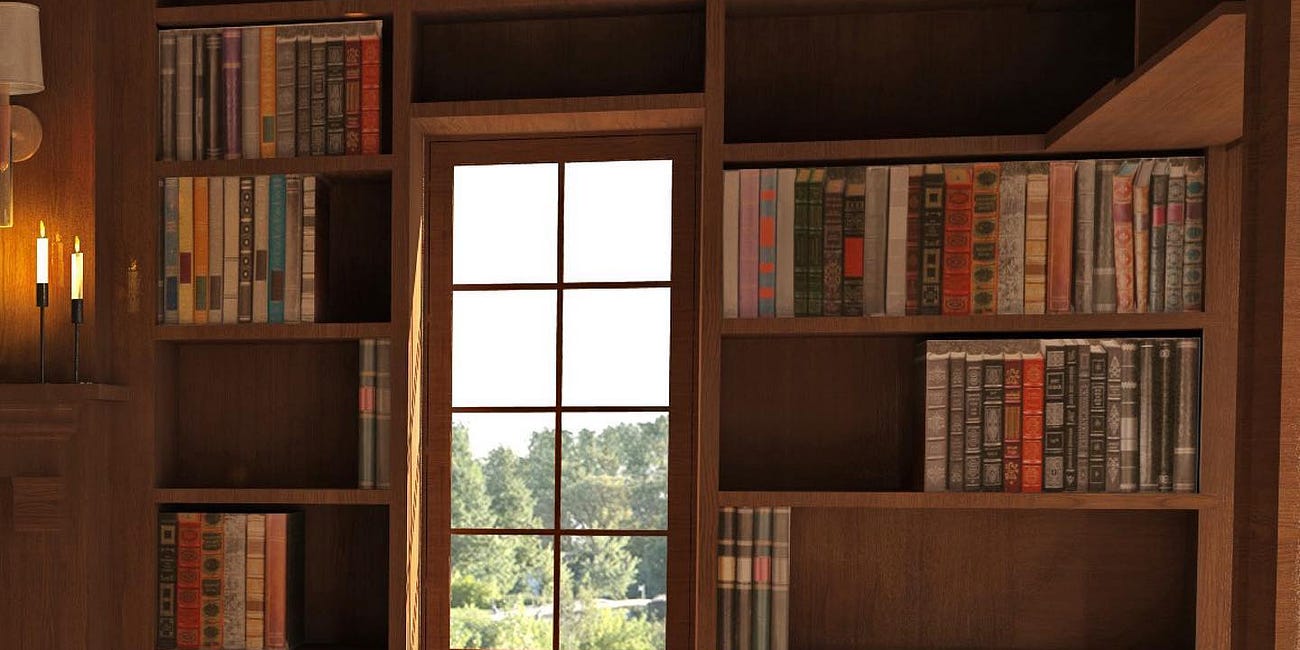Nine Gifts the Revoice Conference Gave Me
All of us have a cross to bear and a desire for deep Christian community. The difference between the experiences of gay and straight Christians is significant but need not overshadow our commonality.
I encourage my readers to listen to the following podcast from Communion and Shalom, on which I was interviewed concerning theological method, being a “natural theologian,” and Christians and same-sex attraction: Weigh and Consider the World: Joel Carini on Nature, Truth, and Side B.
Last Thursday and Friday, I attended Revoice, a yearly conference for Christians who are same-sex attracted, i.e., gay, or who experience gender dysphoria. The conference has received a lot of negative press from theologically and politically conservative Christians. It has led the Presbyterian Church in America to make theological statements and policies in response. Generally, Revoice has a negative reputation in the theological circles from which I hail.
Why Am I Going to Revoice?
Revoice is a yearly conference for Christians who are same-sex attracted or have gender dysphoria. Since 2018, it has been hosted at or associated with Memorial Presbyterian Church in St. Louis, until recently a congregation of the Presbyterian Church in America (PCA). It has attracted controversy in the PCA for adopting the common usage of “lesbian,” “…
However, beginning with my essay, “Same-Sex Attraction and the Misery of Our Condition,” which I published earlier this year, I began to interact with several of the celibate, gay Christians who are part of the theological movement known as Side B, which encourages gay Christians to live in accord with Christian teaching, even while allowing for the terminology of “gay,” “lesbian,” and so on. This led to my being interviewed on the podcast Communion and Shalom, in an episode that aired last Wednesday, which you can listen to here. It also led to me attending Revoice and meeting my interviewers, TJ Espinoza and David Frank, and many other faithful gay Christians. Many thanks to TJ, David, and all those who welcomed me in as a straight Christian!
Same-Sex Attraction and the Misery of Our Condition
My fellow theological conservatives commonly hold that the “Side B,” celibate gay Christian position does not have scripture and the confessions on its side. Side B’s use of the word “gay” is thought to make too many concessions to the cultural and political movement that would transform sexual relationships across Western countries. Specifically, it is…
Several days after the conference, here are nine things that I took away from my time at Revoice.
1. The Commonality We Have as Believers
Much of the discussion of Revoice (and some at Revoice) is about the distinctiveness of the gay Christian experience. But what stood out to me was the commonality between us all as followers of Christ. All of us have a cross to bear, all of us must overcome not only guilt but also shame, and all of us desire deep Christian community. The difference between straight and gay Christian experiences is significant but need not overshadow the commonality.
2. I Have a Sexual Orientation
For the first time, I was in social circumstances at Revoice where I needed to “come out” as straight. This gave me a different place in the conversations I was having and did not go without saying. Given that Side B has persuaded me of the legitimacy of the category of sexual orientation, the logical step was to recognize that I indeed have a sexual orientation. The direction of the sexual desires I experience was not something I chose, and it is something that has implications for my Christian obedience.
3. We All Seek Christian Community
A primary question at Revoice is where gay Christians should turn for Christian community, given that not all will enter mixed-orientation marriages, and churches do not always have a place for celibate believers. Many are disappointed that the church does not always live up to its calling as a community, but that sense extends well beyond the Revoice crowd. I and other friends have thought about this for a long time, and my reflections on the Benedict Option arose from this desire. This is a common Christian aspiration and one that different groups of Christians could discuss together: The homeschool families could have a talk with the gay Christians, and it would be a fruitful conversation!
4. We Need a Variety of Christian Spaces
What Revoice provides for gay Christians is specific discussion of what their calling will look like as a Christian. As parents of three, my wife and I have ourselves been looking for a church to discuss our situation and calling specifically. But the church we attend that discusses the travails and calling of conservative Christian homeschool families looks quite different than Revoice. In fact, people flee Revoice-friendly churches in order to attend there. But to me, this indicates that very different kinds of Christian spaces are necessary in order to address all the spiritual needs of the body of Christ. Would that they could be united! But for the time being, I will settle for separate Christian spaces that address the different callings of different Christians.
5. I Need Friendships and Fellowship
At Revoice, I was personally blessed by the fellowship with other believers. Perhaps it is simply the conference setting, but in that kind of setting, people are very open to building friendships and connections. At the same time, conversations go directly to a spiritual plane, and the fellowship that you experience is unique. I know that gay Christian brothers and sisters attend in order to build such connections and friendships, but I find that it did the same for me, and that I equally need such friendships.
6. Committed Friendships Can Be Meaningful, in Addition to Marriage
Attending a talk about celibate and committed spiritual friendships, it occurred to me that this was not a question for gay Christians only. Is there a place, as there has been in other times, for commitment in friendship? While critics of Revoice often jump to the dangers of two gay Christians of the same sex forming such a partnership, the fact that committed friendships, not to mention intentional communities, could include a member who is straight is easily ignored. The possibility of spiritually supporting another brother in Christ in this way begins to seem viable.
7. Separate the Personal and the Political
If you polled the Revoice attendees for their political leanings, I’m guessing the GOP would not be the favored party. But attendance at Revoice made me set aside my thoughts about how the country ought to be governed. (When I’ve voted, I’ve voted Republican.) Those are so distant from the question of how gay Christians can follow Christ well that they seem almost irrelevant. At the same time, it is not difficult to understand why gay Christians would be suspicious of the tie between Christianity and political conservatism. After all, they are often mistaken for the agents of moral decay under the name of “progress.” As a result, I am not concerned about which way my gay Christian brothers and sisters vote. I am concerned that they find the Christian church supportive in helping them abide by the biblical teaching about sex and marriage.
8. Talk to People, Not Just About Them
While I have written about same-sex attracted, i.e., gay Christians before, it is really nice to be talking to them. You ask different questions and think different thoughts when the individuals in question are your conversation partners. Now, I mostly spent time around gay, male Christians, a group with whom I feel quite comfortable. I know I would feel more uncomfortable around some other attendees of Revoice, and that dovetails with my theological concern about howRevoice applies Side B to “trans”-identifying individuals. (As you can tell, I can’t quite say “transgender.”)1 But I think it is important that I realize the goal would be to talk to these individuals, not simply about them. I hope to have more of an opportunity to do so in the future.
9. Each Person Is Bearing a Cross
While some might view Revoice attendees with suspicion, my overwhelming sense was that I knew of each person there that he or she was making tremendous sacrifices in order to be a faithful Christian. At a Christian conference, you do not always know that. At Revoice, you knew that individuals you met were following Christ in spite of desires that the world would tell them they needed to fulfill. You knew that they were dying to themselves in order to live in conformity with their Christian calling. I found that inspiring and encouraging.
The experience I had at Revoice was a small taste of the kind of Christian community many of us long for: Brothers and sisters bearing a cross together and encouraging one another in that costly way of life. All of us have a cross to bear. Suffering isn’t only for Christians on the foreign mission field. Gay Christians have one cross. Gender dysphoric Christians another. Straight Christians with three small children another. And the obedience of the Christians at Revoice encourages me that the crosses I have to bear in life are worth shouldering. To those brothers and sisters in Christ, I say, thank you.
Individuals who call themselves “trans” at Revoice do not therefore identify themselves as the opposite sex. Primarily, such individuals call themselves “trans” because they experience gender dysphoria. But I am not sure what the boundary is or that there is a settled position on this at Revoice the way there is for same-sex attracted Christians.









#2 makes me smile :). Thanks for sharing your reflections (and your whiskey).
We just finished interviewing Kristyn Komarnicki (who is straight and doesn't experience gender dysphoria/discordance) on C&S, and she talked about the gift it was for her over the last decade or so to build relationships with queer-identifying Christians because it became a part of her own journey of reflecting on her own sexuality and gender in fruitful ways.
Joel, thanks for sharing some of your thoughts and for going out of your comfort zone to join us at Revoice. I'm thankful for your voice in our conversations and for your openness to consider how theology in this area affects our experiences. In reading your list, I appreciate how you enjoyed talking to others and experienced community at Revoice and how the church could perhaps grow in this area. I would urge you NOT to settle for less than what you got a taste for (end of point 4, though I know your point isn't exclusively about community). We need people in your position to also fight for these things (both beloved community and spaces to talk and process about our different callings). I believe it is possible! One cue I take in my personal life and ministry has been from Tim Keller and what he calls the Alternative City from his article called The Gospel and Sex. Here's a short quote: "Christians will fall prey to the world’s views of sex unless we create a community, an alternative city. In this alternative city, singles enjoy their kingdom mission and practice sexual abstinence joyfully. They live in community with Christian families, who do not make an idol out of family or make singles feel abnormal. One of the reasons it is hard to practice the discipline of sex-free romantic involvement is that we don’t have a sufficiently large community of people creating this alternative city." I have found many in the celibate gay community have thought a lot about this, but not as many straight married people in the church have. We all will benefit when we work together as a community and love and serve one another.